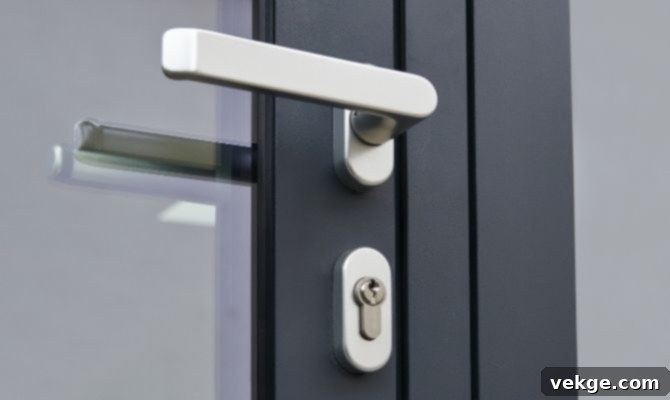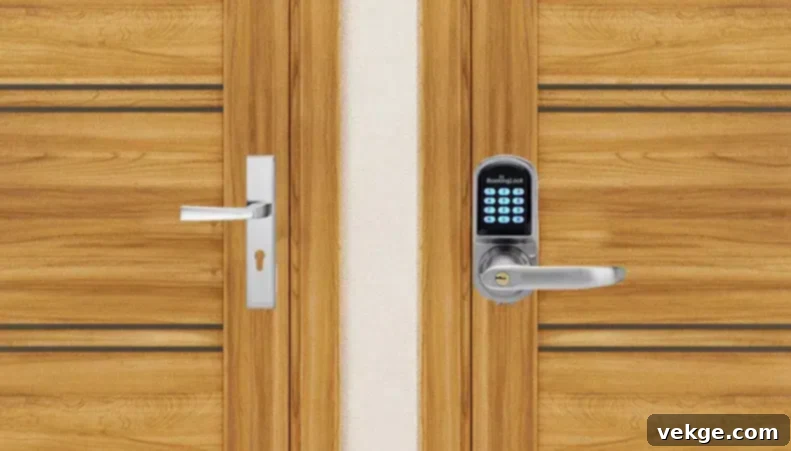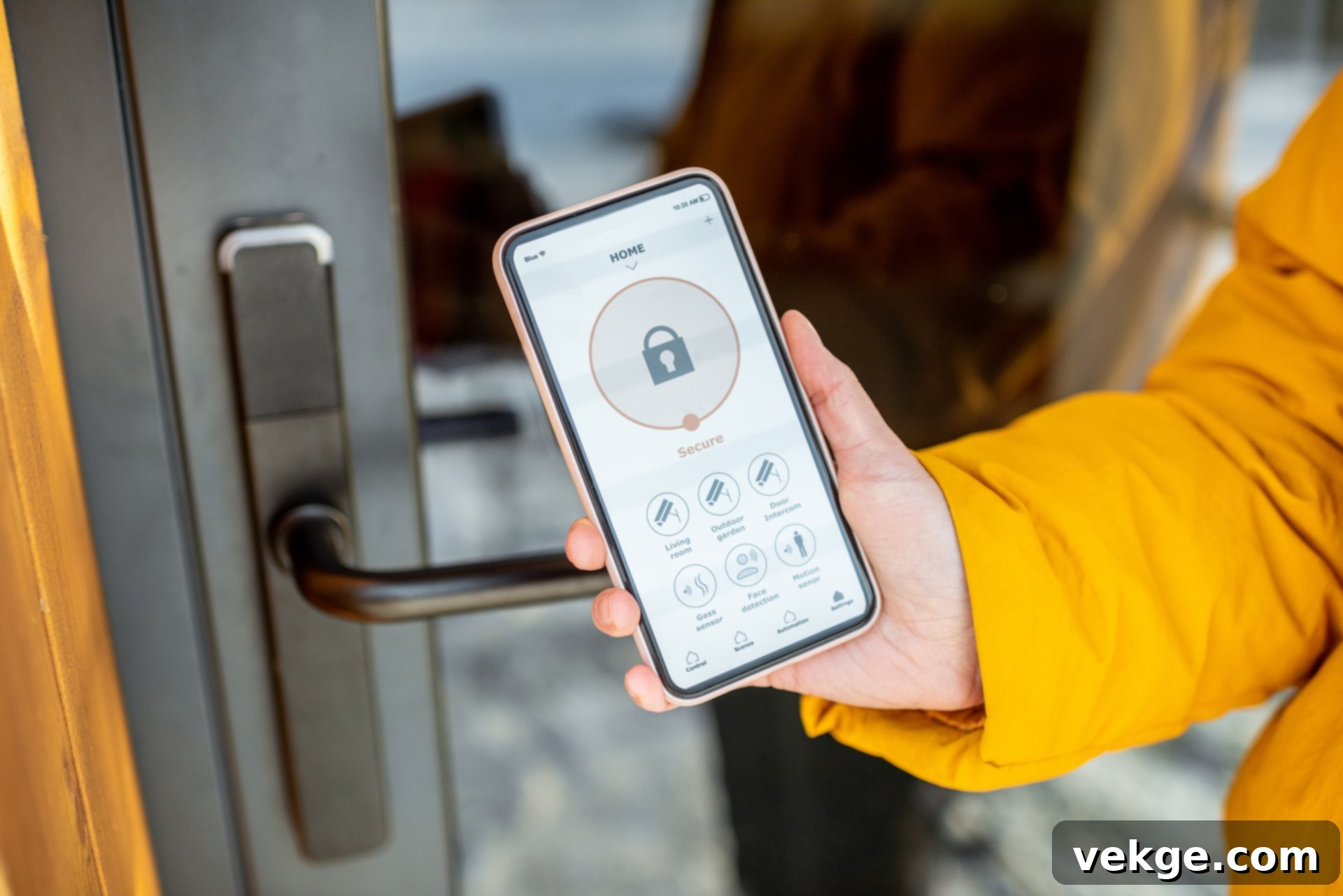Smart Locks vs. Traditional Locks: An In-Depth Locksmith’s Guide to Modern Home Security
In an era of rapidly advancing technology, the landscape of home security is constantly evolving. As homeowners and business proprietors, ensuring the safety and protection of your property is a top priority. When considering an upgrade or installation for your security system, you might find yourself at a crossroads: should you opt for the time-tested reliability of traditional locks or embrace the innovative features of smart locks?
The array of choices can indeed be overwhelming, with each option presenting its own unique set of advantages and potential drawbacks. This comprehensive article aims to dissect the core differences between smart locks and traditional locks, offering insights from a professional locksmith’s perspective. Our goal is to highlight the specific benefits and limitations of each type, empowering you with the knowledge needed to make a truly informed decision that aligns with your security needs, lifestyle, and budget.
Understanding Traditional Locks: The Enduring Foundation of Security

The Mechanics and Evolution of Traditional Locks
Traditional locks, such as robust deadbolts, resilient spring bolt locks, and intricate pin-tumbler mechanisms, have served as the foundational cornerstone of secure door systems for centuries. Their enduring design has evolved over time, yet the fundamental principle remains the same: a physical barrier controlled by a unique physical key. The classic pin-tumbler lock, for instance, operates with a series of pins of varying lengths that must be precisely aligned by the bitting of the correct key to allow the cylinder to turn and unlock the mechanism. This provides a straightforward, highly effective, and widely understood means of securing properties, from residential homes to commercial establishments. Their mechanical nature means they function independently of external power sources or internet connectivity, a characteristic that often provides a sense of unwavering reliability.
Unyielding Benefits of Traditional Locks
One of the most compelling advantages of traditional locks lies in their proven, time-tested reliability and remarkable durability. These mechanical marvels have withstood the test of time, consistently proving their effectiveness against various forms of forced entry. Their independence from electrical power or internet signals is a significant asset, ensuring consistent functionality even during widespread power outages, network failures, or system glitches that might plague more technologically advanced solutions. This lack of reliance translates directly into predictable performance, a crucial factor when security is paramount.
Furthermore, traditional locks typically boast considerably lower initial installation and maintenance costs compared to their smart counterparts. Replacing a lost key or even rekeying a traditional lock is generally a simple and inexpensive process for a qualified locksmith. Their simplicity also often means greater ease of understanding and operation for all users, regardless of their technological proficiency. For many, the reassuring weight of a physical key and the tangible click of a deadbolt provide an unmatched sense of security.
Acknowledging the Drawbacks of Traditional Locks
Despite their undeniable reliability, traditional locks are not without their limitations. The primary vulnerability stems from their reliance on physical keys. Keys can be easily misplaced, lost, stolen, or duplicated without the owner’s authorization, posing a significant security risk. A breach involving a lost or stolen key can be costly and inconvenient, often necessitating a complete rekeying of the affected locks or even a full lock replacement to restore security, which can add up over time.
Moreover, traditional locks inherently lack the advanced convenience features and enhanced control offered by modern smart lock solutions. They provide no audit trail of who has entered or exited, no remote monitoring capabilities, and no flexibility for granting temporary access. Managing multiple physical keys for different family members, employees, or service providers can also become cumbersome, especially for larger properties or busy households.
Exploring Smart Locks: The Dawn of Digital Door Security
Defining What Smart Locks Offer
Smart locks represent the cutting-edge evolution of door security systems, integrating advanced technology to offer unparalleled convenience, control, and sophisticated security features. These innovative devices transcend the limitations of physical keys, providing a multitude of keyless entry options such as smartphone apps (via Bluetooth or Wi-Fi), touch-sensitive keypads, biometric scanners (fingerprint recognition), and even voice commands through integrated smart home assistants. Smart locks are designed to seamlessly integrate with broader smart home ecosystems, allowing for centralized control and automation of various household devices, from lighting to thermostats.
Their operational mechanisms often involve internal motors that physically engage or disengage the deadbolt, controlled by electronic signals rather than mechanical key turning. This digital interface allows for features previously unimaginable with traditional locks, fundamentally changing how we interact with our home’s entry points.
Unveiling the Benefits of Smart Locks
The allure of smart locks largely stems from the enhanced convenience they provide. Keyless entry eliminates the perennial worry of losing or misplacing physical keys, and the hassle of fumbling for them in the dark. Users can grant or revoke access remotely through a smartphone app, an invaluable feature for homeowners needing to let in a pet sitter, cleaner, or repair person while they are away. Many smart locks also generate real-time notifications about who enters and leaves your property, providing an invaluable activity log for monitoring and peace of mind.
Beyond convenience, smart locks often boast advanced security features. This includes encrypted communication protocols to prevent hacking, tamper alerts that notify you of attempted forced entry, and automatic locking functions that ensure your door is never left unlocked accidentally. The ability to issue temporary, time-sensitive access codes is particularly beneficial for short-term rentals or guest management, providing a layer of control traditional locks simply cannot match.
Addressing the Drawbacks of Smart Locks
While the conveniences are numerous, smart locks do come with their own set of challenges that potential users must consider. The vast majority of smart locks rely on batteries for power, which necessitate regular monitoring and replacement. A dead battery, if not attended to promptly, could potentially lock you out of your own home, creating a frustrating and potentially urgent situation. Many modern smart locks do offer backup physical key options or battery boost features, but this still requires forethought.
Furthermore, since many advanced smart lock functionalities hinge on network connectivity (Wi-Fi, Bluetooth, Z-Wave, Zigbee), internet outages or network disruptions can impede their remote operation and advanced features. Another significant concern is cybersecurity; as connected devices, smart locks are theoretically susceptible to hacking attempts. While manufacturers employ robust encryption, ensuring firmware is up-to-date and using strong, unique passwords is crucial to mitigating these risks. The initial investment for smart locks is also typically higher than traditional locks, and some users may find the technological setup and troubleshooting more complex.
Comparing Smart Locks and Traditional Locks: A Detailed Analysis

Security Features: Physical vs. Digital Fortifications
When evaluating security, both lock types offer distinct advantages and potential vulnerabilities. Traditional locks provide robust, time-tested reliability through a purely mechanical system that doesn’t depend on external technology. Their physical nature makes them less prone to digital hacking, requiring direct physical manipulation (like lock picking or forced entry) to bypass. The strength of the deadbolt and the quality of the door and frame are primary determinants of their security.
Smart locks, conversely, leverage advanced digital security features such as encrypted communication, multi-factor authentication, and biometric access. Their major selling point in terms of security is the ability to provide flexible, limited access through unique digital codes that can be changed swiftly without any hardware alterations. Many also include activity logs, tamper alarms, and remote monitoring, offering a proactive layer of security. However, their reliance on software means they must be regularly updated to patch potential vulnerabilities, and the user must be vigilant against phishing or hacking attempts.
Cost Efficiency: Initial Outlay vs. Long-Term Value
The initial purchase and installation costs for smart locks are typically higher due to their integrated technology, complex components, and sometimes more intricate installation procedures. However, they can offer significant savings over time by eliminating the need for expensive rekeying or full lock replacements due to lost or stolen physical keys. The digital nature allows for infinite code changes at no additional cost.
Traditional locks present a considerably lower upfront cost, making them a more budget-friendly option for initial setup. However, they may entail higher long-term maintenance expenses, particularly if frequent rekeying is necessary due to tenant changes, lost keys, or security breaches. The cumulative cost of locksmith services for rekeying can eventually match or even exceed the initial premium of a smart lock, depending on the frequency of such events.
Ease of Use: Simplicity vs. Advanced Functionality
Smart locks offer an incredibly user-friendly experience for individuals comfortable with technology. Features like automatic locking upon closing, voice command capability, and seamless integration with smart home systems enhance daily convenience. Managing access for multiple users, setting schedules, and monitoring entry/exit logs are all easily handled via a smartphone app, simplifying complex access control scenarios.
Traditional locks are undeniably straightforward and universally easy to use; insert key, turn, unlock. There’s no learning curve, no app to download, and no batteries to check. However, they inherently lack the modern functionalities and conveniences that many users now seek. For those who prefer simplicity and a completely manual operation without any digital interaction, traditional locks remain the preferred choice.
Factors to Consider When Choosing Between Smart and Traditional Locks
Type of Property: Residential, Commercial, or Rental
The nature of your property significantly influences the ideal lock choice. For residential homes, smart locks offer unparalleled convenience for family members, especially those who tend to misplace keys, and provide peace of mind through remote monitoring. For commercial properties, robust traditional locks might be favored for their sheer physical deterrence and straightforward security protocols, though smart locks with advanced access control features are increasingly popular for managing employee access. Rental properties, particularly short-term vacation rentals, benefit immensely from smart locks due to the ease of issuing and revoking temporary digital access codes for guests, eliminating the need for key handovers or rekeying.
User Accessibility and Management
Consider who will be using the lock. For family homes with young children or elderly individuals, smart locks can provide easier access without the fiddliness of physical keys, using simple keypad codes or even biometrics. It also allows parents to track when children arrive home. For those who frequently have guests, cleaners, or delivery services, the ability to grant temporary, time-limited access codes remotely with smart locks is a game-changer. Traditional locks require physical key distribution and collection, which can be logistically challenging and insecure.
Budget Constraints: Holistic Financial Planning
Budget always plays a pivotal role in determining the most suitable option. While smart locks represent a higher initial investment, it’s crucial to consider the total cost of ownership over their lifespan. Factor in potential long-term savings from not having to rekey, the value of added convenience, and enhanced security features. Traditional locks offer a more cost-effective solution for budget-conscious consumers upfront, but remember to factor in potential future expenses for rekeying or key replacement if security is compromised or keys are lost frequently.
Technological Comfort Level
Your comfort level with technology is a critical, yet often overlooked, factor. If you appreciate the simplicity of mechanical devices and prefer to avoid apps, connectivity issues, or battery management, traditional locks might be a better fit. Conversely, if you embrace smart home technology, enjoy the convenience of digital control, and are willing to manage the occasional technological hiccup, smart locks will likely enhance your daily life significantly.
Internet Connectivity and Power Reliability
For smart locks that rely on Wi-Fi for remote functionality, stable internet connectivity is essential. If your property is in an area with unreliable internet or frequent power outages, a smart lock that heavily depends on these might not be the most practical choice for continuous, reliable access. Many smart locks offer offline functionality for local access (e.g., via Bluetooth or keypad), but remote features will be impacted.
Making a Decision: Which Lock Is Right for You?
The ultimate decision hinges on a careful assessment of your personal priorities and specific property requirements. Do you prioritize the unparalleled convenience and advanced features offered by smart technology, or do you place greater value on the proven, robust reliability and simplicity of traditional mechanical mechanisms? Both smart and traditional locks possess distinct merits, and the optimal choice is about finding the perfect balance between your desired level of convenience, your security needs, and your overall lifestyle.
The Evolving Future of Lock Technology
The world of door security is in a constant state of flux, propelled by rapid advancements in technology. We are already witnessing the emergence of innovative solutions such as hybrid locks, which ingeniously blend the best aspects of traditional and smart technologies. These systems offer the mechanical reliability and physical key backup of traditional locks, combined with the convenience and advanced features of smart locks (e.g., keypads, app control). This development promises to deliver a comprehensive security solution, offering the best of both worlds. Further advancements in biometrics, artificial intelligence for anomaly detection, and seamless integration with wider IoT (Internet of Things) ecosystems are poised to redefine door security in the coming years.
The Indispensable Role of Professional Locksmiths
Professional locksmiths play an absolutely critical role in guiding consumers through the often-complex array of security options available today. Beyond simply installing locks, they possess deep expertise in the mechanics of traditional systems and a thorough understanding of the latest smart lock technologies. They provide invaluable, impartial insights into how various solutions can be integrated into individual security needs, assess potential vulnerabilities, and offer tailored recommendations. Furthermore, their professional installation services ensure that any chosen security system functions optimally, adhering to safety standards and manufacturer guidelines.
The Importance of Consulting a Professional Locksmith
Before making a final decision, it is highly recommended to engage a professional locksmith to conduct a comprehensive assessment of your specific security needs. An expert can evaluate factors unique to your situation, such as the type of property, existing door hardware, local security risks, your technological compatibility, and your precise budget. Their expertise ensures that whatever decision you make, whether it’s opting for a state-of-the-art smart lock or reinforcing your traditional system, it will genuinely enhance your security effectively and provide the peace of mind you deserve.
Conclusion: Securing Your Future with the Right Lock Choice
Ultimately, both smart locks and traditional locks offer unique advantages designed to cater to different security priorities and personal preferences. There is no one-size-fits-all answer; the most suitable choice is deeply personal. By thoroughly understanding your priorities, meticulously evaluating your property’s specific requirements, and realistically assessing your budget constraints, you can confidently navigate the decision-making process towards the most appropriate and effective security solution for you.
Remember, safety and security are paramount, and the expert guidance provided by professional locksmiths is an invaluable resource in making these critical, informed decisions. For those residing in Perth and seeking to make the optimal choice between these two powerful security options, consider consulting with Advanced Lock & Key. Their professionals can offer personalized advice and services, guiding you on your journey to a safer, more secure environment for your home or business.
